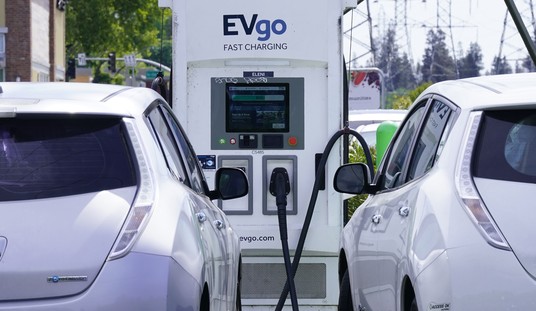Over the past few weeks, I’ve written about the risks of dependence on foreign resources that will come with the “green” energy revolution, at least in the direction favored by the Obama administration. Elements required for critical components such as lithium batteries for electric cars cannot be found in massive quantities within the US, and a number of the rare-earth elements needed for these components are mainly found in China — which can be fairly described as an economic competitor of the US at the very least. Today’s report from the Financial Times should drive that point home and send up red flags on “green” mandates, both literally and figuratively:
Prices of some rare earth metals have doubled in just three weeks amid heavy stockpiling in China that has raised fears over global supplies.
China produces more than 90 per cent of the world’s rare earths, 17 elements used in hybrid cars, fluorescent lights and many high-tech applications. …
Japan and the US, the world’s biggest importers of rare earths, have repeatedly voiced concerns to China, while complaints from industrial users of rare earths have been growing. Last year, China cut their exports by 40 per cent and temporarily banned exports to Japan during a political dispute.
American policymakers should keep China’s treatment of Japan in mind. By making our economy entirely dependent on rare-earth imports from China, the US will be handing Beijing a big, fat veto on American policy, especially in — but not necessarily limited to — foreign policy. Politicians will scoff, but no one wants to be in Congress or the White House when a trade dispute (or anything else) sends the country into recession. You can ask Democrats in 2010 about that, or Republicans in 2008, for that matter. China understands how to wield its power, and it won’t shy away from doing so with the United States.
Ironically, one of the top political rationales to use government mandates and influence to convert personal transportation onto the electrical grid is the notion of energy independence. That’s a fallacy at the most basic level, as there is no domestic energy resource abundant and reliable enough to handle the electrical demand from adding millions of cars to the electrical grid except for fossil fuels and nuclear power, none of which environmental activists want to allow. But with China in control on the manufacturing side, we can’t even be assured the ability to build the machines in the first place, let alone fuel them, unless we agree to give China a veto on American policy.
People complain about the autocratic and arbitrary nature of OPEC and the greed of oil speculators, but at least that energy infrastructure has some built-in safeguards. First, that market does not have a shortage of resources, nor does it have a shortage of producers. The US is sitting on tens of billions of barrels of oil (perhaps hundreds of billions) that we could access if we had the political will to do so, plus almost unlimited natural gas, coal, and so on. Speculators affect the market somewhat disproportionately in part because the US refuses to access its own reserves, creating a mild, artificial scarcity. Rare-earth elements really are scarce, and they are mainly controlled by only one producer nation. OPEC will look like a country club in comparison to China’s central control of critical “green” energy elements.
GE and other corporations looking to cash in on the Obama administration’s green-energy policies want the White House to take action to guarantee reliable domestic sources of rare-earth elements. Unfortunately, we have no real proven reserves of these elements in the US, so it will take the kind of exploration and mining that the EPA is attempting to stop in coal and natural gas to find it — if it exists. To produce it on the scale needed if it indeed exists at all, we would have to roll back decades of EPA obstacles to American energy production. As the Financial Times noted, the only reason China has its proven reserves is that Beijing imposes only “lax environmental standards” to make rare-earth mining cheap enough to be profitable.
Why not do that for the energy resources we already know we have — and at least with natural gas, will produce a clean energy that can power the American economy for centuries while we work on other energy forms for the future? Isn’t that smarter than signing up to be a puppet of Beijing?








Join the conversation as a VIP Member